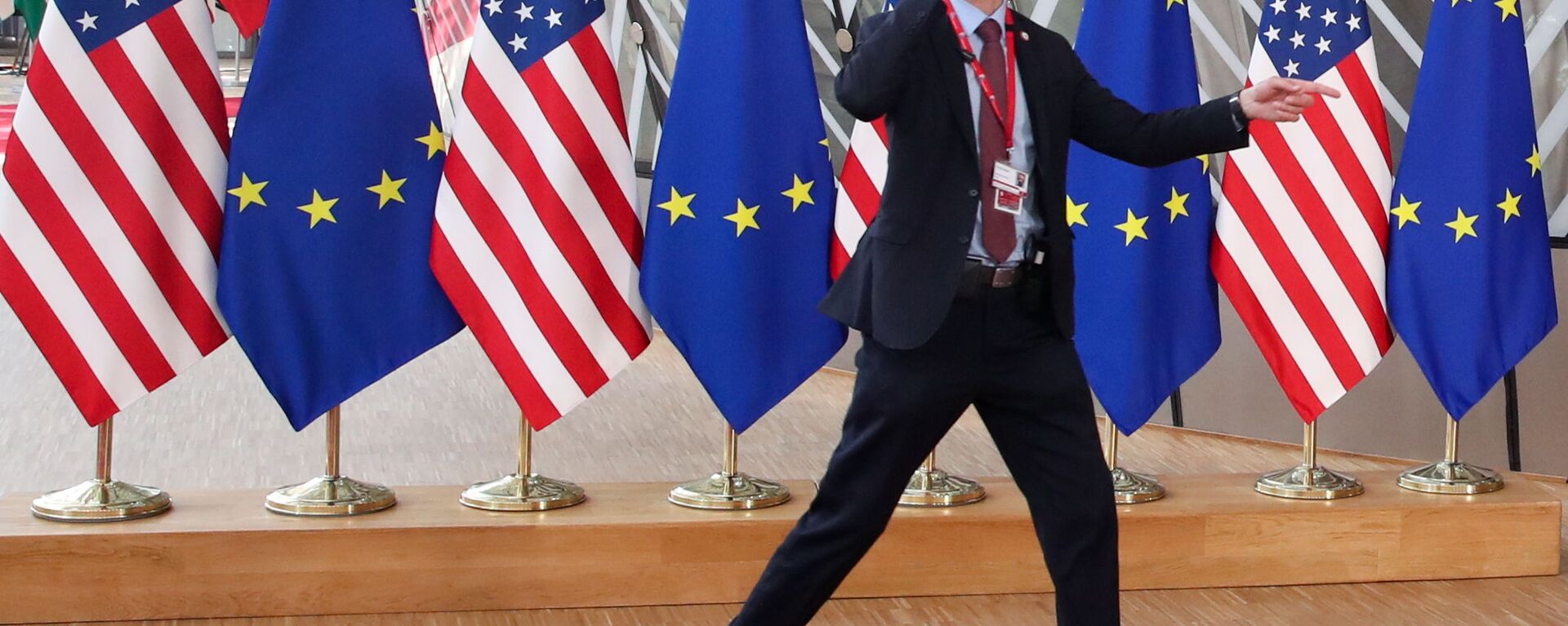https://sputnikglobe.com/20230912/multinationals-brace-for-eus-new-corporate-tax-framework-1113315577.html
Multinationals Brace for EU's New Corporate Tax Framework
Multinationals Brace for EU's New Corporate Tax Framework
Sputnik International
Europe is poised for a tax proposal called BEFIT, as the EU is set to disclose fresh regulations on Cross-border profit allocation, whereby multinationals strategically allocate profits and expenses within the bloc to reduce their tax liabilities. But, controversy brews over the shift in profit redistribution.
2023-09-12T18:09+0000
2023-09-12T18:09+0000
2023-09-17T06:40+0000
economy
europe
newsfeed
ursula von der leyen
european union (eu)
https://cdn1.img.sputnikglobe.com/img/07e7/09/01/1113035896_0:204:2917:1845_1920x0_80_0_0_84c40b451d8257dc0181d2363e7fa082.jpg
In a twist of events, the European Union has resolved to do away with redistributing profits to its members accrued from multinationals due to a new corporate tax framework, as per draft proposals obtained by media.However, the European Commission's president, Ursula von der Leyen, promised "a single set of tax rules for doing business in Europe.”The original idea of the EU executive was to introduce a "formulary apportionment". This means that the total pre-tax profit earned by multinationals would be split between various jurisdictions, depending on where exactly the entities of the said corporation create value.Members of the EU kicked against it, citing potential tax revenue losses. Smaller EU nations that receive lower taxes from multinationals would not benefit from the hefty corporate taxes, because such companies had prior arrangements to register their profits with them rather than in jurisdictions where they record huge patronage or where a sizeable part of their workforce or manufacturing assets are.Now, the bloc's executive proposes that corporate entities with big yearly accruals above €750 million should have a novel tax pool system called aggregate tax base. However, aviation and shipping, including oil and gas companies, are excluded from this concept.In practice, corporate bodies will continue paying taxes to several countries due to national tax rates, although under the aegis of the EU framework regarding what's liable to tax.In seven years, companies taxable under this scheme will pay tax in accordance with their share of the aggregate tax base. By implication, they are liable to pay an average taxable income in the past three years.A statement released by the commission envisages to "pave the way for a permanent allocation method that could be based on formulary apportionment."The objective is to grant multinationals smooth claims to trans-border compensation for losses and to boost the confidence of active businesses within the EU on their tax bills.But such a move has received whiplash from one EU MEP, Paul Tang, a Dutch socialist and chair of the European Parliament's subcommittee on taxation. "[EU Economy Commissioner] Paolo Gentiloni needs to maintain the ambition of the reform," he said.Moreover, every proposal concerning taxation is subject to a complete accord of EU countries, whereas several efforts to adopt standard tax rules have suffered vetoes.The 27-member union agreed to a global tax deal comprising a minimum corporate tax rate of 15 percent and fragmentary redistribution of profits of the world's wealthiest companies across the EU. This has prompted the bloc to act, this time hoping for a consensus. However, corporate bodies have voiced concerns about this issue because of its timing, as they expect the global corporate tax rate to kick off in 2024.
https://sputnikglobe.com/20210713/eu-puts-its-corporate-tax-plan-on-hold-after-us-pressure-1083376284.html
Sputnik International
feedback@sputniknews.com
+74956456601
MIA „Rossiya Segodnya“
2023
Chimauchem Nwosu
https://cdn1.img.sputnikglobe.com/img/07e7/09/01/1113046371_0:99:1536:1635_100x100_80_0_0_9c5c627283eca931c39fe4852bbb301c.jpg
Chimauchem Nwosu
https://cdn1.img.sputnikglobe.com/img/07e7/09/01/1113046371_0:99:1536:1635_100x100_80_0_0_9c5c627283eca931c39fe4852bbb301c.jpg
News
en_EN
Sputnik International
feedback@sputniknews.com
+74956456601
MIA „Rossiya Segodnya“
Sputnik International
feedback@sputniknews.com
+74956456601
MIA „Rossiya Segodnya“
Chimauchem Nwosu
https://cdn1.img.sputnikglobe.com/img/07e7/09/01/1113046371_0:99:1536:1635_100x100_80_0_0_9c5c627283eca931c39fe4852bbb301c.jpg
european union (eu), redistributing profits, multinationals, corporate tax framework, ursula von der leyen, pre-tax profit, tax revenue losses, smaller eu nations, corporate entities, aggregate tax base, aviation and shipping, oil and gas companies, national tax rates, formulary apportionment, meps (members of the european parliament), paul tang, paolo gentiloni, eu countries, global tax deal, corporate tax rate.
european union (eu), redistributing profits, multinationals, corporate tax framework, ursula von der leyen, pre-tax profit, tax revenue losses, smaller eu nations, corporate entities, aggregate tax base, aviation and shipping, oil and gas companies, national tax rates, formulary apportionment, meps (members of the european parliament), paul tang, paolo gentiloni, eu countries, global tax deal, corporate tax rate.
Multinationals Brace for EU's New Corporate Tax Framework
18:09 GMT 12.09.2023 (Updated: 06:40 GMT 17.09.2023) Europe is poised for a tax proposal called BEFIT, as the EU is set to disclose fresh regulations on cross-border profit allocation, whereby multinationals strategically allocate profits and expenses within the bloc to reduce their tax liabilities. But, controversy is brewing over the shift in profit redistribution.
In a twist of events, the European Union has resolved to do away with redistributing profits to its members accrued from multinationals due to a new corporate tax framework, as per draft proposals obtained by media.
However, the European Commission's president, Ursula von der Leyen, promised "a single set of tax rules for doing business in Europe.”
The original idea of the EU executive was to introduce a "formulary apportionment". This means that the total pre-tax profit earned by multinationals would be split between various jurisdictions, depending on where exactly the entities of the said corporation create value.
Members of the EU kicked against it, citing potential tax revenue losses. Smaller EU nations that receive lower taxes from multinationals would not benefit from the hefty corporate taxes, because such companies had prior arrangements to register their profits with them rather than in jurisdictions where they record huge patronage or where a sizeable part of their workforce or manufacturing assets are.
Now, the bloc's executive proposes that corporate entities with big yearly accruals above €750 million should have a novel tax pool system called aggregate tax base. However, aviation and shipping, including oil and gas companies, are excluded from this concept.
In practice, corporate bodies will continue paying taxes to several countries due to national tax rates, although under the aegis of the EU framework regarding what's liable to tax.
In seven years, companies taxable under this scheme will pay tax in accordance with their share of the aggregate tax base. By implication, they are liable to pay an average taxable income in the past three years.
A statement released by the commission envisages to "pave the way for a permanent allocation method that could be based on formulary apportionment."
The objective is to grant multinationals smooth claims to trans-border compensation for losses and to boost the confidence of active businesses within the EU on their tax bills.
"We try to maximize benefits for businesses without rocking the boat for finance ministers," an EU official noted.
But such a move has received whiplash from one EU MEP, Paul Tang, a Dutch socialist and chair of the European Parliament's subcommittee on taxation. "[EU Economy Commissioner] Paolo Gentiloni needs to maintain the ambition of the reform," he said.
Moreover, every proposal concerning taxation is subject to a complete accord of EU countries, whereas several efforts to adopt standard tax rules have suffered vetoes.
The 27-member union agreed to a global tax deal comprising a minimum corporate tax rate of 15 percent and fragmentary redistribution of profits of the world's wealthiest companies across the EU. This has prompted the bloc to act, this time hoping for a consensus. However, corporate bodies have voiced concerns about this issue because of its timing, as they expect the global corporate tax rate to kick off in 2024.




